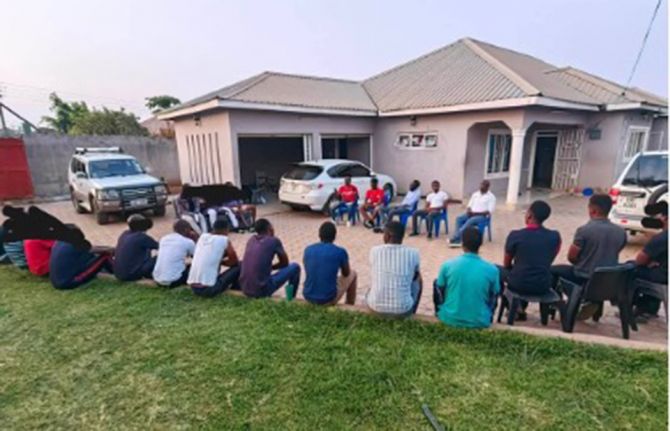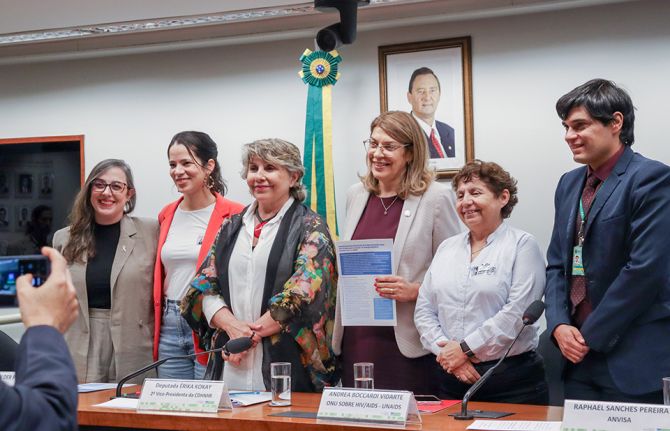
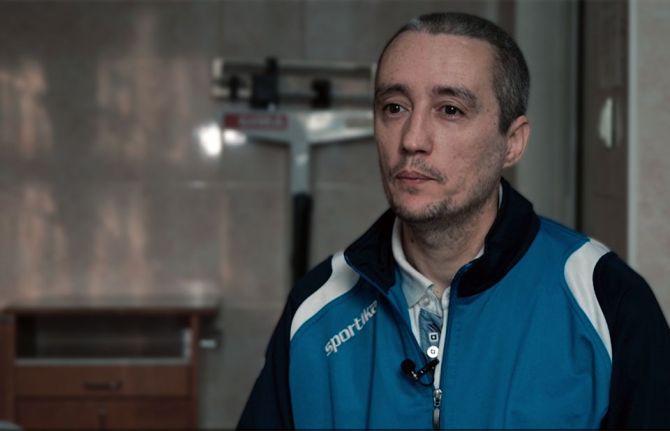
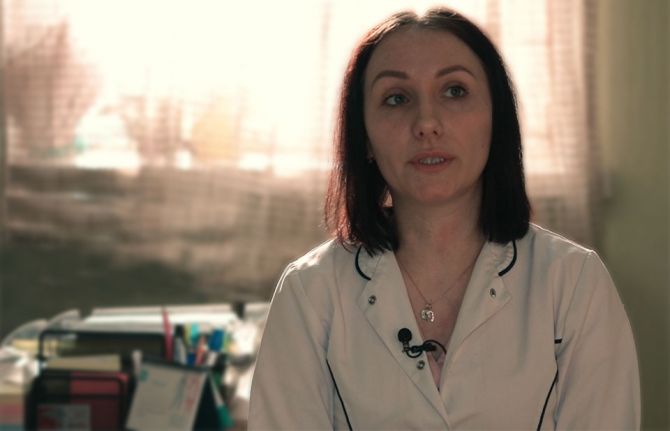

Feature Story
Moldova expands harm reduction services to all prisons
05 May 2023
05 May 2023 05 May 2023Alexander Godin moves through a number of locked doors escorted by a guard to prison 16’s pharmacy. This is part of his daily routine. He comes to get his medicine – a syrup-like dose of methadone. Methadone is an opioid agonist therapy (OAT) to help people overcome withdrawal symptoms, decrease heroin dependence and prevent HIV infection from infected needles.
Since 2000, a few prisons in Moldova offered such harm reduction services.
Now all do.
“I have been on methadone substitution treatment for 10 years,” said Mr Godin. His family urged him to take advantage of such services so he could get healthy again.
“For years I used drugs and opioids and for this, money was needed so problems began among my family,” he said. Since he has been on the programme, he feels much better.
Any new prisoner to the country’s 17 penitentiaries sees a psychiatrist, a doctor and if needed is offered to join a treatment programme. Comprehensive harm reduction services not only include drug dependence treatment but also needle syringe exchange and HIV testing and treatment. HIV prevalence is 11% among people who inject drugs in Moldova vs 0.36% among the general population.
They are one of the most affected groups in the country.
For Maria Potrîmba Head of Infectious Diseases at prison 16 (Pruncul) helping prisoners stave off drugs has positive knock-on effects.
“If a patient is on this substitution treatment the person is more aware of consequences and will more likely adhere to their other treatment,” she said.
The prisons also make sure to provide clean syringes with a regular pick-up every two days carried out by volunteer prisoners.
The head of medical unit at prison 13 (Chisinau) believes harm reduction services are important for both inmates and prison employees.
“The volunteers are all prisoners and the vast majority of them are also people who have been treated for communicable diseases like HIV or hepatitis or tuberculosis,” Oleg Costru said.
Moldova has committed more resources to the prison programme over the years. “In the beginning, when these services were developed, they were actually financed from external sources,” said Irina Barbîroș, head of the medical department at the national prison administration. “Over the years, the state assumed its commitment and took over the financing of these services from the state budget.”
UNAIDS, UNODC and WHO have been long-time supporters of expanding these services to all prisons. Currently, according to Harm Reduction International, only 59 countries globally provide OAT in prisons.
This, even though harm reduction has been proven to not increase the number of people with drug dependency but rather provide personal and public health benefits.
Svetlana Plamadeala, UNAIDS Moldova country director, has seen the pilot projects gain traction in the country and is quite proud of the success of the nationwide coverage.
“It is really about putting people in front and people at center as well as taking on a solid public health approach,” she said. For her, to end AIDS, protecting the health and human rights of people who use drugs is key. “It is about equalizing.”
Watch video
Region/country
Related

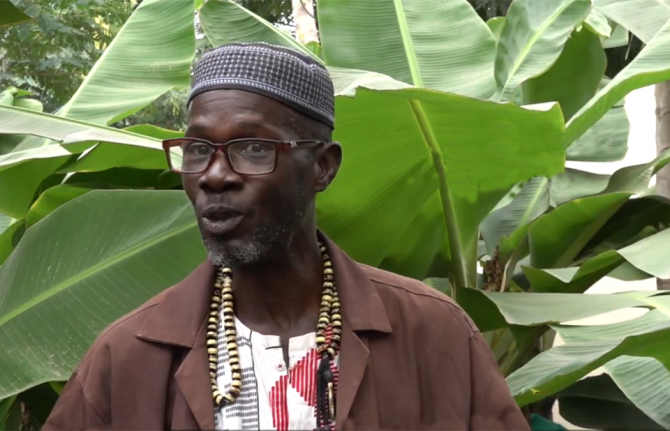
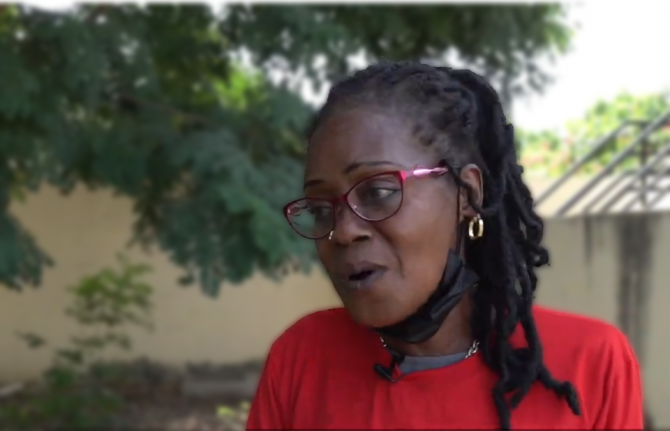
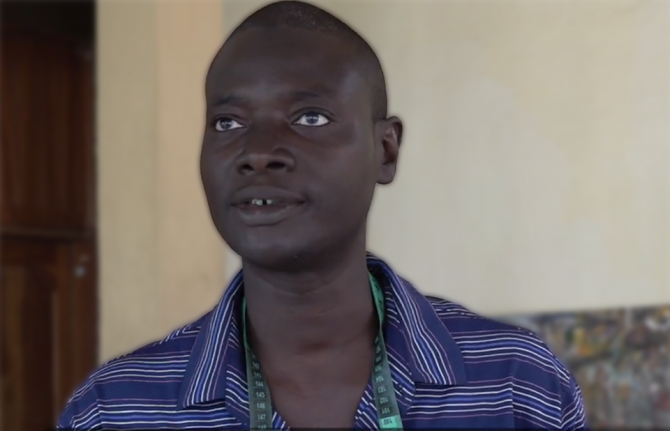
Feature Story
Leave no one behind and that includes people who use drugs
04 May 2023
04 May 2023 04 May 2023Daouda Diouf comes daily to the Fann Hospital compound daily. He is one of 250 people enrolled in CEPIAD*’s opioid substitution therapy programme (OST). OST is a globally recognized intervention to reduce injecting behaviours that put people who inject drugs at risk of contracting HIV and other blood-borne diseases, such as viral hepatitis.
“I am here to take my treatment and I am also a tailor, so I teach a few other users of drugs how to sew,” Mr Diouf said, cutting fabric in his makeshift outdoor workshop. Keeping occupied and selling his wares has helped him stay healthy for the last seven years.
Another enrollee agrees. He has found a passion for gardening and now oversees other patients at the centre’s green area.
For El Hadj Diallo, planting seeds, pruning trees is like a type of therapy. “When we are here, we forget our problems, I am happy doing it and it’s therapeutic for me,” he said.
Their other therapy consists of a daily dose of methadone. Mangane Boutha, the centre’s pharmacist carefully measures and distributes each dose in his office.
“Methadone is a medicine that acts as a heroin substitute, in our case it’s a syrup that is dosed in 10mg/ml portions with doses varying from patient to patient,” he explained.
Founded in 2014, CEPIAD has cared for more than one thousand people and is one of the first harm reduction centres in West Africa. Aside from opioid substitution, clean needle exchange and psychosocial support, they also offer health care.
“CEPIAD has become a testing and diagnostics center for HIV, and also tuberculosis as well as hepatitis and we distribute condoms,” said Dr Idrissa Ba, who coordinates the centre.
In Senegal, HIV prevalence among people who inject drugs is 9%, well above the 0.5% among the general population. Globally, due to stigma and criminalization, people who inject drugs face a 35 times higher risk of acquiring HIV than people who do not inject drugs.
Three-quarters of patients here are men but CEPIAD has been working hard to reach more women. Among people who use drugs, women are more likely to live with HIV, according to Dr Ba.
Mariama Ba Thiam, who formerly used drugs, lived for years on the streets. She is now a peer educator in Dakar. “I go out into the community and visit colleagues to raise awareness about getting off drugs and also how to reduce health risks so I refer them to CEPIAD and they can do like me, stop drugs,” she said.
Her plea: Get more funds to get more women and young people to come to the centre.
In Senegal, whilst drug use is a criminal offense, CEPIAD’s work has the support of the government, the United Nations as well as other partners.
On international Harm Reduction day, UNAIDS firmly believes that if we are to end AIDS by 2030, we can’t leave anyone behind. And that includes people who use drugs.
*The Centre de Prise en Charge Intégrée des Addictions de Dakar (CEPIAD)
Watch video
Region/country

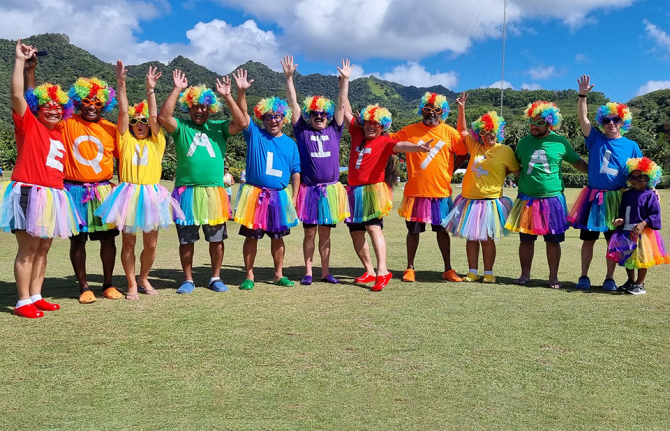
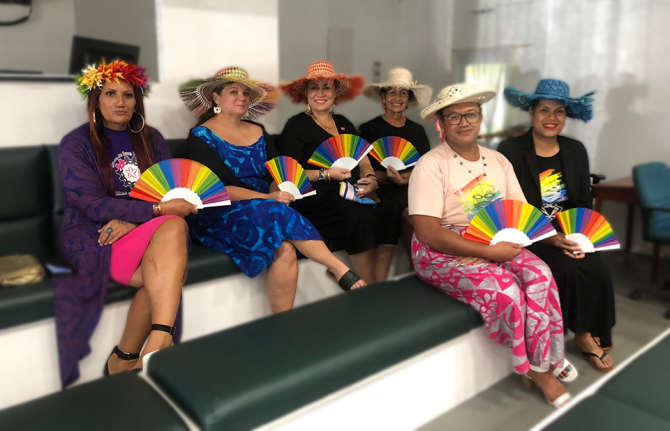
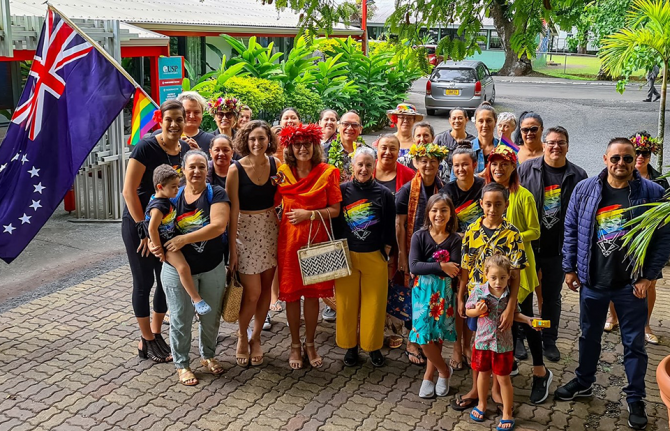
Feature Story
Cook Islands’ original path toward equality
27 April 2023
27 April 2023 27 April 2023On April 14th members of the Cook Islands rainbow community assembled at parliament with colourful flags and cautious optimism. It turned out to be the day they’d been working toward for the last twelve years. Parliament removed laws prohibiting consensual sex between men, striking out sections of the Crimes Act that had been on the books since the turn of the 20th century.
“This decision by Cook Islands is part of a wave of global progress around abolishing harmful laws,” noted UNAIDS Asia Pacific Regional Director, Eamonn Murphy.
“This was a huge historical moment,” said Valery Wichman, President of the Te Tiare Association, the nation’s oldest lesbian, gay, bisexual and transgender (LGBT) organisation. “It’s not just a win for the community, but also a shift in terms of our nation maturing and upholding the constitutional rights of all people.”
Ms Wichman, an attorney and public servant, is also an akava'ine—a Māori word meaning transgender woman. She attests that the anti-LGBT laws which made so-called “sodomy” and “indecent acts” punishable by imprisonment reinforced prejudices. This contributed to the LGBT community’s exclusion, harassment and bullying. She has herself experienced being mocked and assaulted.
“A lot of people chose not to live here. It was too hard for them to endure their family’s and society’s judgment. The idea that you are not worthy has carried down from parents to children and has affected how we have been treated by our peers. A lot of trans women have not gone to the doctor because they have been misgendered and have felt disrespected. There have been cases where they ended up dying,” she said.
The journey toward law reform started in 2011. The spark was the discriminatory response to the nation’s first HIV diagnosis. Te Tiare led the advocacy charge with support from organisations including the Cook Islands Family Welfare Association.
A Crimes Bill drafted around 2013 removed the discriminatory clauses. In 2017 parliament set up a Standing Committee to review its raft of proposed revisions. Support for civil society to prepare submissions outlining public health grounds for reforms was provided by the United Nations Development Programme (UNDP), the lead agency amongst the United Nations Joint Programme on HIV and AIDS working on effective democratic governance and issues affecting sexual and gender minorities.
But following a political change the next year, the committee’s Chair recommended retaining the ban on gay sex. What’s more, he proposed a new section criminalising sex between women. The bill remained in limbo for years. Reform efforts seemed to hit a wall.
A strategy of public dialogue and political engagement rooted in Cook Islands culture enabled a breakthrough. Pride Cook Islands (PCI) was formed as a sister organisation to Te Tiare, focusing on this public advocacy branch of work.
“Obviously we are in a unique situation as a small, conservative, religious population,” PCI President, Karla Eggelton began. “The work of advocacy becomes more delicate when you are living beside people making these decisions for you. We welcomed support from international allies, but we knew we had to do this our own way and have our own approach that is mindful of the situation and culture we live in.”
First TCI tackled messaging. There were deep deliberations around word choice. The mandate was to keep the conversation simple. Ultimately the cause was framed as an equality issue. The rallying cry became, ‘don’t make us criminals in our own country’.
The organisation stayed in communication with policymakers on both sides of aisle. They not only explained their position, but sought to understand politicians’ concerns.
The group met with traditional leaders who are grassroots decision-makers. Village communities were invited to have conversations during public meetings.
“It offered an opportunity for us to understand the misperceptions. We were able to explain that all we are asking for is to not be made criminals. People said, ‘we don’t want to send you to jail, we love our neighbours and our family’,” Ms Eggelton remembered.
The organisation’s patron is Lady Tuaine Marsters whose husband, Sir Tom Marsters, is the British King’s Representative. Lady Marsters frequently attended consultations. Other spokespersons included parents and people with standing in the church. At times supporters were invited to simply stand in solidarity. But anyone who would speak was carefully prepared.
“We spent hours articulating what we would say. We reaffirmed our pledge to not become emotional. We had to keep each other in check to make sure we did not say anything we could regret,” Ms Eggelton outlined.
Then came an effort to increase visibility. The call for equality was largely coming from the LGBT community. They needed other people to demand the same. So PCI embarked on a campaign for people to show their support either by lending their voice to the public dialogue or flying the rainbow flag. The group distributed free flags, urging people to fly one for their daughter, son or grandchild. From restaurants to bars, t-shirts to earrings, the display of support resonated.
A first-of-its-kind pride ad on TV, newspapers and radio challenged Cook Islanders: “We are good enough to be your teachers, nurses, choreographers, dressmakers and orators… but not good enough in the eyes of the law. We are already part of your community, we are just asking you to recognise us as equals.”
This visibility and advocacy work was supported by UNDP through the Being LGBTI in Asia and the Pacific program. PCI developed a project to strengthen the digital capacities of community organisations. A critical outcome was the Pride Pledge Cook Islands initiative with the business community which provides visible safe spaces for LGBT people.
“The UNDP support was instrumental in promoting acceptance and awareness and utilising digital tools to share our message,” Ms Eggelton said.
TCI conducted frequent polls to gauge public sentiment. At the start of the process they lagged behind reform opponents. But by the time would-be Prime Minister, Mark Brown, made an election promise to change the law last year, public sentiment had tilted.
“Once we were able to establish that it was really about equality, then we saw a changing of the tide,” Ms Eggelton reflected.
Ultimately the entire government bench voted in favour of an Amendment Bill while opposition leader, Tina Brown, and two of her Members of Parliament also supported.
Renata Ram, UNAIDS Country Director for Fiji and the Pacific, noted that seven other countries in the Pacific region retain laws criminalising same-sex relations.
“The Cook Islands example proves that along with law reform we can have national dialogues about inclusion, justice and equity,” Ms Ram said.
At a national ceremony marking the end of the South Pacific cyclone season the rainbow community gathered once more, this time to give thanks.
“We want to make sure people understand our gratitude for everything that has transpired and for everyone who worked hard to achieve this,” Ms. Eggelton said. “Our community is now recognised through the eyes of the law as being equal. Now people can feel safe, not like second class citizens.”
Our work

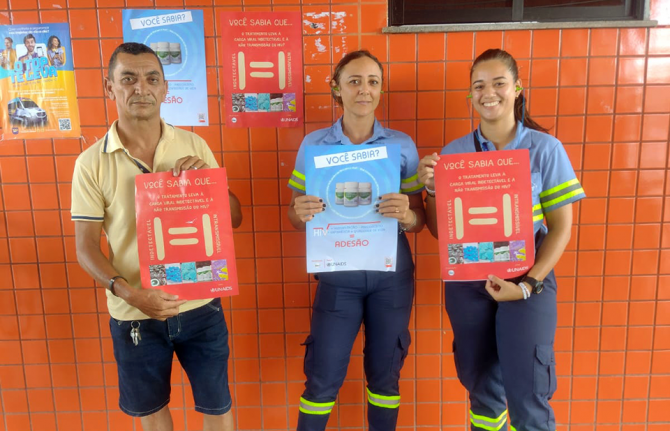
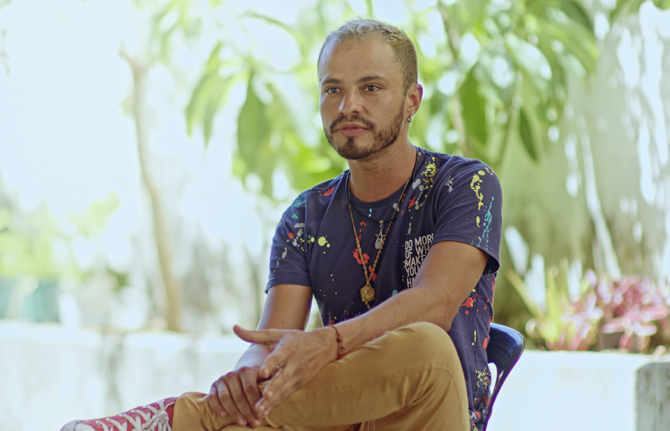
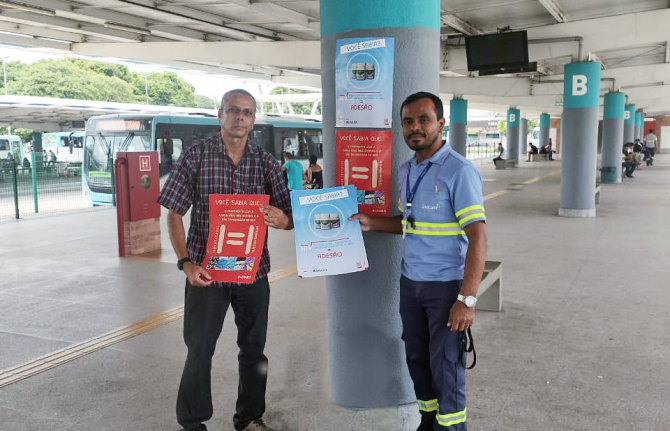
Feature Story
In Northeast Brazil, civil society and local government collaborate to increase HIV treatment adherence
03 April 2023
03 April 2023 03 April 2023In 1988, a group of activists came together in Fortaleza, the fifth largest city in Brazil and capital of Northeastern state of Ceará, to create the local chapter of the National Network of People Living with HIV and AIDS (RNP+CE). The aim was to ensure that people living with HIV could be guaranteed the right to care, treatment adherence, and legal assistance.
Currently, the NGO (Non-Government Organizations) also offers educational workshops, support for the combination prevention of sexually transmitted infections (STIs), and other activities for more than 1,000 registered people. Among them is Carlos Salmão, an HIV activist living in Fortaleza, who felt individually and collectively welcomed by the organization. "This support was very important to me and is fundamental for people living with HIV here in Ceará because it is a reference of the response to the AIDS epidemic. That is why I feel pleasure in contributing", he explains.
The RNP+CE was one of five Brazilian NGOs that received resources from the Fast-track Cities grants initiative, launched by UNAIDS in 2022. With the award, the organization developed actions around two objectives: increasing linkage and adherence of vulnerable key-populations to HIV prevention, diagnosis, and treatment by disseminating and sharing information with health professionals as well as the general public; and improving the knowledge of the Undetectable Equals Untransmittable (U = U) strategy in the city of Fortaleza by carrying out communication campaigns.
Project actions and participation of municipal government
The project involved 10 local HIV-positive activists in the development and implementation of the communication campaigns. They also were involved in preparing a seminar that brought together 120 people from civil society to dialogue about and to present to municipal government representatives proposals to improve the care for people living with HIV, based on the perspectives and actual needs of the users of public health services in Fortaleza. An additional theme of discussion was the challenges and the importance of guaranteeing a satisfactory level of adherence to HIV treatment to avoid abandonment.
Still as part of the project, a booklet on HIV, self-esteem and health was produced and distributed, providing practical information for people who receive a positive diagnosis for HIV. Additionally, in coordination with the municipal government, RNP + CE printed and distributed more than 3,000 copies of posters on HIV treatment adherence and on U = U. This material was displayed in places with high concentrations of people, such as bus terminals, reaching about 1.1 million people daily.
Participation of local government officials was a strategic element to the project’s success, as they are in direct contact with reality and the existing challenges. "We are still far from reaching an ideal level where there is less need to reinforce these [HIV] actions, but we are advancing in this direction through constant and well-structured work", says Carlos Paiva, coordinator of IST/AIDS at the Municipal Health Secretariat of Fortaleza.
Ariadne Ribeiro, UNAIDS Officer for Equality and Rights for All People, agrees and adds: "It is rewarding to see how the dialogue between communities, civil society, and the municipal government is moving towards a common goal, which is the improvement of public policies in the city of Fortaleza for people living with HIV and to end AIDS as a threat to public health."
Watch
Region/country
Related

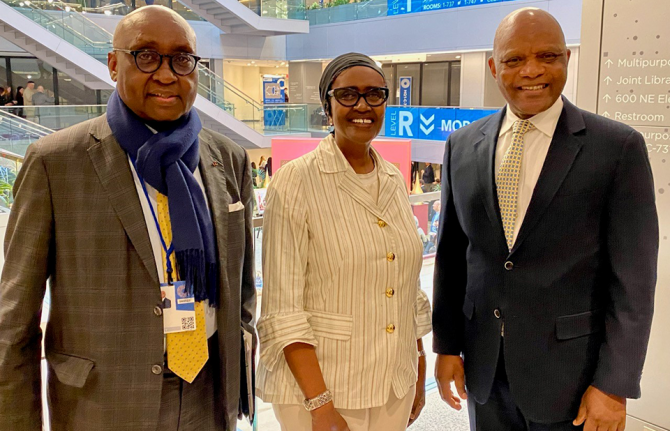
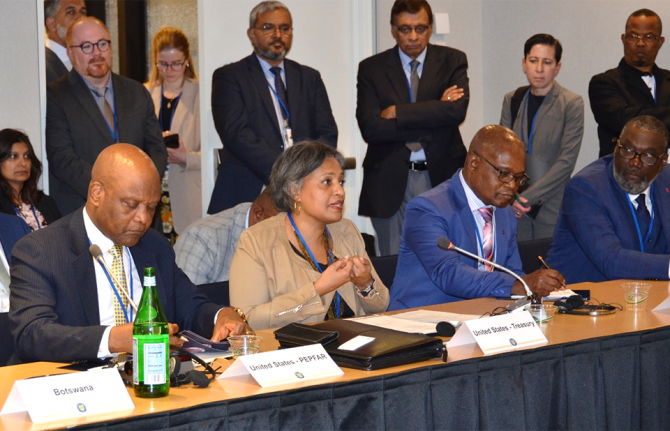
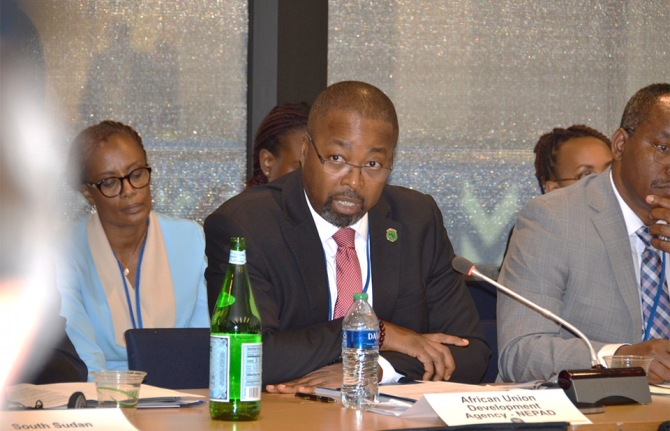
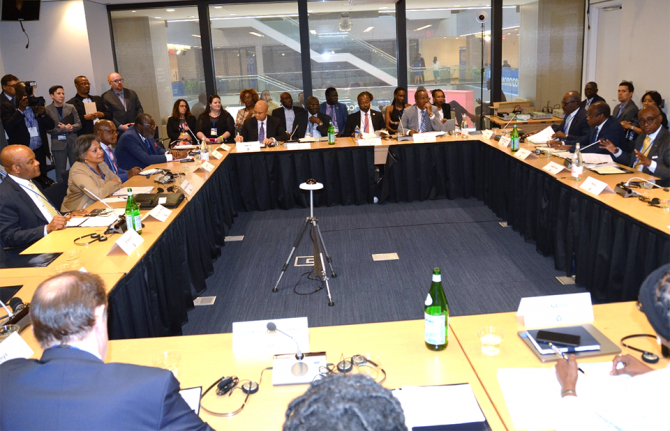
Feature Story
African ministers of finance join forces to highlight the importance of financial sustainability in the response to HIV
01 May 2023
01 May 2023 01 May 2023Although great strides have been made in tackling HIV in recent years, Africa remains the continent most affected by HIV and progress towards ending AIDS is stalling. The COVID-19 pandemic, global inflation, growing debt levels, and a retreat from overseas development assistance by some donors are hampering Africa’s efforts to ramp up national HIV responses and are jeopardizing broader outcomes for health, social development and economic growth.
UNAIDS estimates that globally, low and middle-income countries will need investments of US$ 29 billion annually to meet targets of ending AIDS as a public health threat by 2030. In 2021, only US$ 21.4 billion was spent on HIV responses low and middle-income countries.
In order to advance urgent and collaborative action to keep HIV high on political agendas and re-prioritize funding for health and HIV, African ministers of finance joined international partners on the sidelines of the World Bank / International Monetary Fund Spring meetings in Washington DC to explore ways to ensure financial sustainability of domestic HIV responses.
During the event, Ministers of Finance and senior representatives from Angola, Burundi, Democratic Republic of the Congo, Eswatini, Kenya, Lesotho, Nigeria, Mozambique, Rwanda, South Sudan, Tanzania and Uganda, and the Minister of Health of Côte d’Ivoire came together with global partners, including PEPFAR, the US Department of the Treasury, UNAIDS and the Global Fund to Fight AIDS, TB and Malaria.
Participants explored co-creating country-led paths towards the sustainability of the HIV response within broader health financing challenges. In the dialogue with Ministers of Finance, several issues were explored, among those, the need to overcome financing bottlenecks for HIV, expand local production of medicines and health technologies, or strengthen health systems and pandemics preparedness, while considering the relevance of developing joint HIV financial sustainability road-maps.
The event, ‘Investing in Sustainable HIV Responses for Broader Health Security and Economic Resilience in Africa’, was moderated by Donald Kaberuka, Chair of the Board of the Global Fund to Fight AIDS, Tuberculosis, and Malaria and the African Union’s High Representative for Financing, the Peace Fund and COVID-19 response. The event included remarks by;
- Alexia Latortue, Assistant Secretary for International Trade and Development, US Department of the Treasury,
- Dr. John N. Nkengasong, US Global AIDS Coordinator and Special Representative for Global Health Diplomacy, PEPFAR, US Department of State,
- Winnie Byanyima, Executive Director, UNAIDS, and
- Symerre Grey Johnson, Head of Regional Integration Infrastructure and Trade, New Partnership for Africa's Development (AU/NEPAD)
Participants also reflected on the finding of the recently released report by the Economist Impact, supported by UNAIDS, titled A Triple Dividend: The health, social and economic gains from financing the HIV response in Africa. The report provided evidence showing that fully financing the HIV response to get back on track to achieve the 2030 goals will produce substantial health, social and economic gains in 13 countries in sub-Saharan Africa.
This meeting was the first in-person discussion among ministers of finance and international partners around the sustainability of the HIV response held since COVID-19 travel restrictions were lifted. The meeting will be followed by a series of regional and in-country engagements to advance the financial, political and programmatic sustainability of the HIV response in preparation for the African Union’s Assembly of Heads of State Extraordinary Session on Ending AIDS by 2030.
Our work

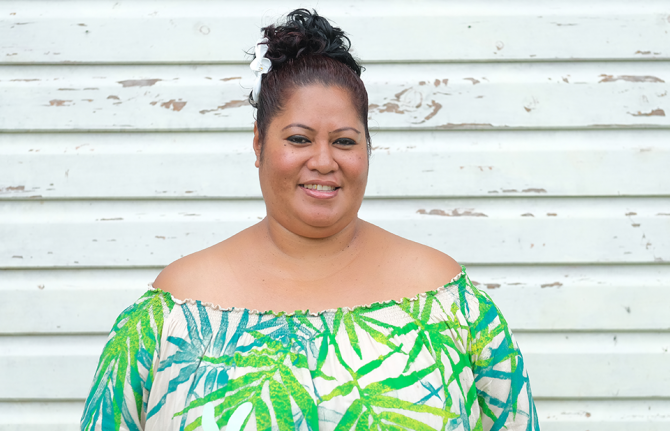
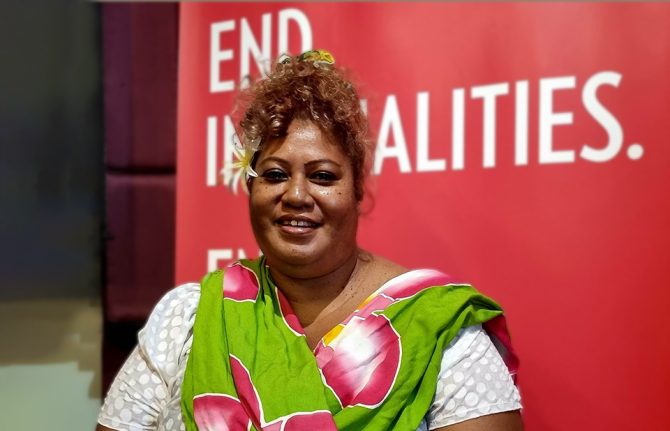
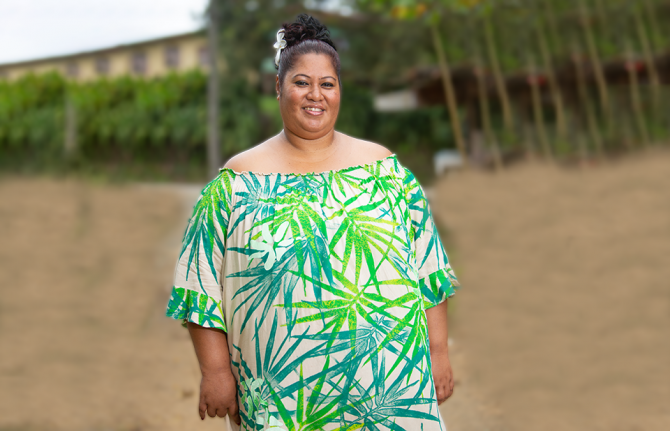
Feature Story
The power of visibility — My story as the first person who came out as a person living with HIV in Fiji
18 April 2023
18 April 2023 18 April 2023Jokapeci Cati is the Program Manager and founder of the Fiji Network for Positive People (FNP+). This is her self-told story of how she became the first person living openly with HIV in Fiji.
I grew up in the harbour town of Suva. I was brought up in the Seventh Day Adventist Church. During youth camps we had two sessions on HIV. To me it was just a session. I had this perception that I am not promiscuous so I can’t become HIV positive.
I got married at 21 and got infected in my marriage. I was diagnosed in 2000 but I suspect I was living with HIV since 1999. My husband was sickly and became bed ridden. I did not blame him. I felt like he got infected before we were married and did not know he was living with HIV. In 2003 he died due to AIDS-related causes. He was 31.
We did not have treatment in Fiji at that time. People living with HIV were just monitored. When I was diagnosed they told me “you have to look after yourself because you can die”. In the initial stages there was depression, denial and stress. But as soon as I got diagnosed one of my dreams was to meet another person living with HIV.
With my family there was no change in the way they treated me. It was support from the word go. I did not see any element of discrimination from my parents and siblings.
Going public
Coming out was not an overnight decision for me. It took me six months to juggle the pros and cons. Somehow my mind was not dwelling on the negative. Because there was no support system in place at the time, I felt the need to speak out.
So I started with the church. I went to the pastor and told him of my diagnosis. Then I had to disclose to my church community. The hardest bit was opening up to your very own people. Once I gained the support of the church I spoke to the Council of Chiefs, Fiji’s traditional leaders forum. Because those platforms gave me a positive reception I then went to the media because I felt I was ready to speak to the nation.
Organising and advocating
In 2003 I was privileged to meet the right people at the Ministry of Health and we coordinated the first meeting of FNP+. By 2004 I got the organisation registered, up and running.
From the start I was advocating for treatment because I could see my first husband dying. The Ministry of Health’s HIV coordinator at the time, Maire Bopp Dupont, connected us to the Asia Pacific Network of People Living with HIV. That is how I got to know that other countries in the region were offering treatment. We went to the Council of Chiefs and Parliamentarians to advocate. The Health Ministry at the time was saying “we are not ready… we need to put the systems and structures in place”. I think because we came out publicly it put some pressure on them. The very next year, in June, treatment was available.
It was exciting. For the first time we felt the advocacy was worth the sacrifice. Our work involved talking to nurses, doctors and civil society organisations that were part of the care team. I started antiretroviral therapy five years ago when we adopted the “treat all” policy. It is so exciting that we are able to take treatment with the assurance that we would live! And it is for free!
Living life fully
I did not let HIV decide my future. Because of being part of the FNP+ management team I found the need to venture into education. I got a degree in psychology and social work from the University of South Pacific.
When I lost my first husband I was in this dilemma about whether to have children. I met my current husband in the HIV organisation. When we decided to have children, it was a public affair in Fiji. I was an HIV positive, pregnant woman. It was a learning curve for me and the entire nation.
The UNAIDS Goodwill Ambassador for the Pacific, Ratu Epeli Nailatikau, was Fiji’s President at the time. He made it his business to come to the hospital during my delivery and my first son’s HIV test. He wanted a copy of my son’s HIV negative test result. This became his advocacy document. He has been spreading the message since then that there is no need to discriminate against women living with HIV who want to have children. It’s time we support them through prevention of mother-to-child transmission (PMTCT) treatment. I am now the mother of three HIV negative children.
The way forward
We are working to get FNP+ funding from the Global Fund to continue our national activities and regional support. I’m glad the focus is now on community-led monitoring and services and that it’s coming from the donor’s mouth.
Other Pacific countries don’t have networks of people living with HIV. Fiji is the only one. People throughout the region are living in isolation. Our second piriority is to organise at the regional level.
Our third challenge is that although everyone who is living with HIV is encouraged to take treatment, we have stockouts. At one point we weren’t getting Dolutegravir so people had to change to a combination of drugs until it became available. Labs are also a challenge, especially the turnaround time for viral load tests. If FNP+ does not continue to apply pressure to address these issues people would suffer silently.
HIV in a small island developing state
For sure people living with HIV from key population communities have had a more difficult time. They were ostracised, they were discriminated against. I did not face that. There was a time, around 2004 and 2005, when people who died due to AIDS had to be burned at night before the sun rose! The stigma and discrimination are not as bad as that now, but they still exist.
I think in the Pacific it is really hard to come out with your HIV status because of our small size. We have these connected communities and if someone comes out it is easy to trace who else could be HIV positive. We have this communal upbringing so people don’t want any negative repercussions for their families.
When other people living with HIV meet me, they are happy. They want to come out and speak, but they don’t know how. Now there is funding for this community engagement in more Pacific countries. We just need to give them support and a bit of time.
Fiji recently received technical support for the seventh cycle of Global Fund applications and the Indo Pacific HIV Prevention Program supported by the Australian Department of Foreign Affairs and Trade (DFAT). UNAIDS Pacific supports peer network meetings to encourage sharing among PLHIV. UNAIDS also recently collaborated with Rainbow Pride Fiji Foundation, the Australasian Society for HIV, Viral Hepatitis and Sexual Health Medicine (ASHM) and the National Association of People with HIV Australia (NAPWHA) to develop a PLHIV booklet in the local languages. This booklet provides information on living with HIV and helps empower PLHIV to take control of their health and wellbeing. This project is supported by the New Zealand Ministry of Foreign Affairs and Trade and DFAT.
Region/country

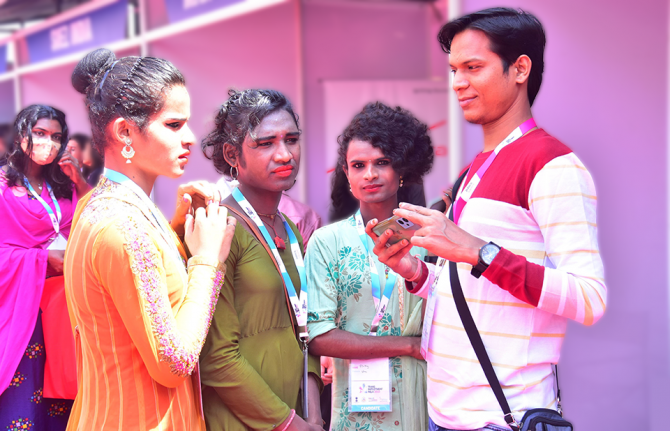
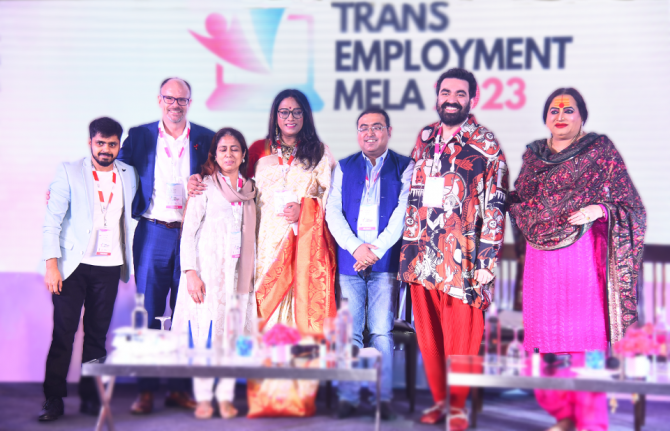

Feature Story
Beyond transgender visibility: India works toward employment equity
31 March 2023
31 March 2023 31 March 2023Ratrish Saha is a transgender woman from Kolkata, India. Even with seven years’ work experience, she was anxious about applying for a new job last year.
“Finding a job is never easy being a transgender woman. I would get rejected with statements like ‘currently no LGBT hiring is going on’ or ‘we do not have facilities to accommodate a trans individual in our office’,” she recalled. But through the Transgender Welfare Equity and Empowerment Trust or TWEET Foundation, she was paired with suitable opportunities in corporations that have received sensitivity training. She soon landed the position of associate consultant for Siemens Technology in Bangalore.
She said of the interview process: “I only talked about my skills and no gender explanations were included in those conversations.” An ecstatic Ms. Saha says she is “grabbing the opportunity… putting my all into it”.
Transgender people in India now have a new pathway toward dignified work thanks to a collaborative effort between communities, government and development partners.
Ahead of the International Day of Transgender Visibility, the UNAIDS Country Office for India and United Nations Development Programme (UNDP) supported the Trans Employment Mela (Job Fair) in New Delhi. The initiative was jointly hosted by the National Institute of Social Defence, Ministry of Social Justice and Empowerment, TWEET Foundation and In Harmony, a diversity consulting firm.
The programme aims to accelerate the socio-economic inclusion of the trans community by bringing awareness about their issues to mainstream corporations and providing a platform to connect them with job roles in inclusive organisations.
“Not only does this approach provide an opportunity for dialogue between government representatives, civil society organisations, and businesses, but it facilitates access to skills training, career counselling, entrepreneurship support and mentorship support,” Maya Awasthi, Co-Chair and Co-founder of TWEET Foundation explained.
India’s 2019 Transgender Persons (Protection of Rights) Act prohibits employment discrimination against trans people in either the public or private sectors. While stakeholders point to aspects of the law that could be strengthened, they acknowledge that the wide-ranging anti-discrimination provision creates a pathway toward building a more inclusive culture and pursuing redress when rights are violated.
Addressing employment access inequality is relevant to the HIV response. In 2021 HIV prevalence among transgender people in India was 3.8%, almost 20 times the national average. A study commissioned by India’s National Human Rights Commission found that in 2017 just six percent of transgender people were formally employed in either the private or non-governmental organisation (NGO) sector. About 5% engaged in sex work and domestic labour respectively. Thirteen percent sold food and other items while 11% reported begging.
“There are many ways in which higher paying and consistent work can reduce HIV vulnerability,” explained UNAIDS Country Director for India, David Bridger. “By addressing the inequalities that have unfairly pushed trans people away from opportunities, we can help build a more empowered community in which people fulfil their potential, enjoying better health and wellbeing in the process.”
The 2017 Human Rights Commission study found that around half the transgender population never attended school. Several development partners are supporting initiatives to provide the community with education opportunities in a stigma-free environment as well as skills training to promote self-reliance.
Aarav Singh is a transman who had been out of work for six months. He was able to score a human resource internship at Roop Automotives through the Trans Employment Mela.
“This is a sensitised, trans inclusive organisation where I've faced zero issues with documentation. Not only me but my friends have scored great opportunities with some of the leading trans inclusive companies,” he said. “I hope this continues.”
But while the Trans Employment Mela beneficiaries acknowledge the community dimension of their challenge, in other respects they feel like any other hopeful young professional or recent graduate.
Yumnam Thawalngamba Meetei completed an MBA in 2022 but found it difficult to get a management position “or even a small job”.
“With the help of TWEET Foundation I got into Mahindra Logistics Limited as an Executive for Talent Management and Organisational Development in Mumbai. I am thankful for this job to pave a path for my success,” he said.
Region/country

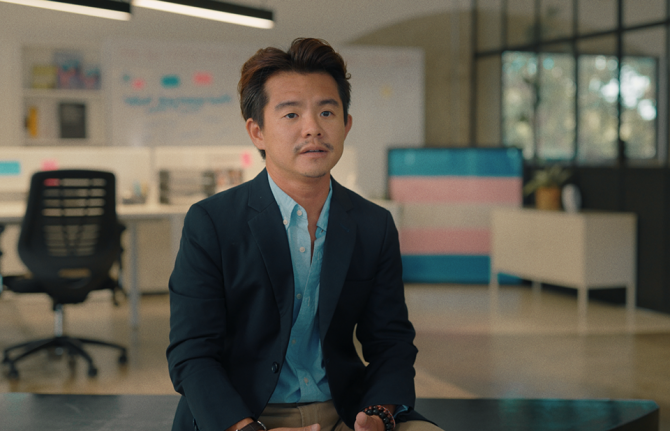

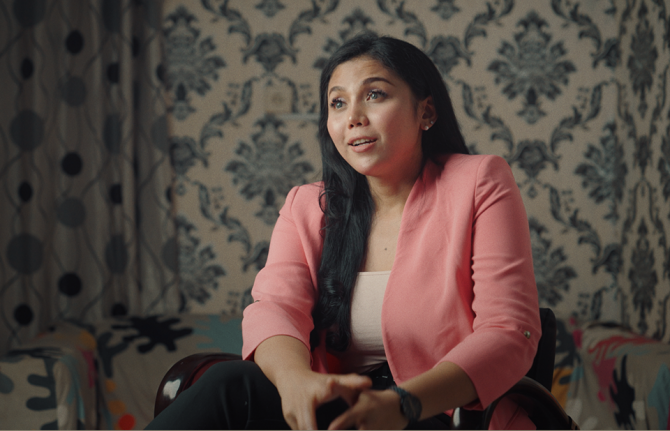
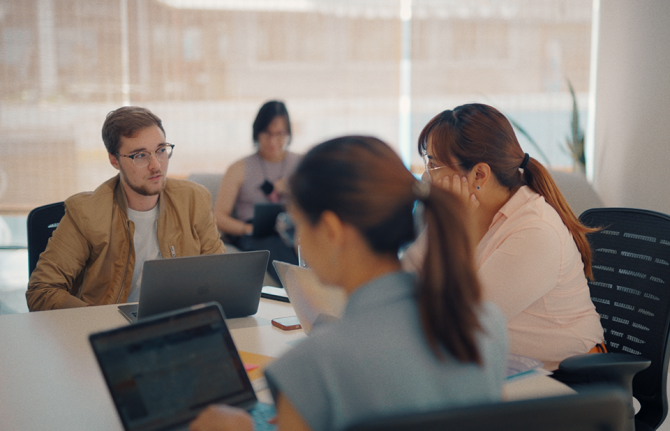
Feature Story
Healthcare access is fraught for trans people in Asia and the Pacific. Communities are working to change this.
31 March 2023
31 March 2023 31 March 2023Zara Fauziah is a transgender woman from Indonesia. She learned she was living with HIV in 2017, but for four years coped with her diagnosis alone. The hospital where she could receive treatment wasn’t welcoming.
Rere Agistya, another Indonesian transwoman, explains why: “If we come to get services or to get checked for HIV, we often get lectures with the purpose to ‘cure’ us. Most of the time they blame our activities: ‘Well you know you are a man. Why do you want to be a woman?’”
Many countries in the Asia Pacific region lack national guidelines on transgender care. As a result, healthcare workers often miss the mark on delivering non-discriminatory and medically appropriate services.
This is a critical gap for the AIDS response given the disproportionately high HIV rates among transgender people. HIV prevalence for the community is around four percent in India and the Philippines. In Cambodia, Indonesia, Malaysia and Thailand, roughly one in ten transgender women lives with HIV.
Samira Das lives in Chingrihata, India. She is a Hijra (Hijras include transgender and intersex people).
“When my family members came to know I am HIV positive they separated my utensils and other things. They got me treated but they kept me in isolation. I stayed there, bearing everything,” she said.
“People nowadays don’t die from HIV. They die from stigma and discrimination surrounding their physical and mental health and sometimes surrounding their sexuality as well as other sociodemographic factors,” Indonesian transgender physician and researcher, Dr. Alegra Wolter explained. “I’ve seen trans people who stop HIV medications because they don’t get the proper mental health services.”
But Dr. Alegra emphasises that the issue goes beyond HIV. Transgender people have inadequate access to everything from primary healthcare to hormonal therapy. With support from the Robert Carr Fund, Youth LEAD partnered with the Asia Pacific Transgender Network (APTN) to conduct a situation analysis on trans youths’ access to healthcare in Indonesia, Thailand and the Philippines.
“We conducted the study to raise the visibility of young trans people in the conversation around trans rights and healthcare, especially since they experience stigma and discrimination both as young people and as trans people,” explained Leo Villar, Youth LEAD’s Communications and Project Officer. “The study showed that young people seek knowledge from peers and undergo do-it-yourself treatments. This could lead to incorrect healthcare information and the misuse of hormones or HIV drugs.”
Preliminary findings from the online study commissioned in December 2022 found that many transgender people between ages 18 and 30 endure systemic discrimination and abuse when accessing healthcare.
“I experienced an incident where an officer asked for my identification and made fun of me. This made me feel uneasy as it occurred twice. As a result, I have been avoiding healthcare services,” one survey respondent said.
Researcher, Dr. Benjamin Hegarty, noted that more than half (52%) the study participants strongly agreed that they worried about being negatively judged because of their gender identity or sexuality when accessing care. Around one-third thought this could negatively impact their evaluations and diagnoses. Asked about their top priorities for healthcare and funding, the majority of respondents pointed to the need for gender clinics, access to universal health coverage as well as counseling and mental health services. Also high on the list were trans-related health research and education about gender diversity.
APTN has just launched the Towards Transformative Healthcare Module. This is a self-paced, interactive online training which is designed as an introductory resource on trans competent and gender-affirming healthcare for medical professionals and other healthcare workers in Asia and the Pacific. This includes those working in primary care and community-based health services.
The module uses a rights-based approach that departs from “pathologising models” that treat transgender people as abnormal. Instead, it promotes transformative and culturally sensitive care. Twelve topics are covered including gender diversity, mental health, sexual and reproductive health and gender-affirming care.
“Through this module, healthcare providers and trans clients can learn how to work together to create positive change and achieve HIV epidemic control,” said APTN Executive Director, Joe Wong. “We are emphasising core principles which can be applied by healthcare professionals even in areas with limited resources and training opportunities.”
The Southeast Asia Stigma Reduction Quality Improvement (QIS+D) Network and Community of Practice are co-convened by the University of California, San Francisco, the Asia Pacific Network of People Living with HIV (APN+) and the UNAIDS Asia-Pacific Regional Support Team. As part of their shared aim to reduce stigma and discrimination in healthcare settings, these initiatives seek to improve the health experiences of trans people by forging partnerships among providers, policymakers and communities.
“Changes can be made at the facility and community levels that make a huge difference in the lives of transgender people,” said Quinten Lataire, UNAIDS’ Regional Human Rights and Law Adviser. “Collaborating with communities, peer navigation and building friendly clinic services are proven approaches. At the same time transgender clients need training about how to navigate care, along with counselling so they can process the issues around their gender identity.”
Online spaces can play a key role in this community support function. For example, using the UNAIDS COVID-19 Communications Grant, APTN developed a COVID-19 Trans Resilience Social Media Tool Kit that included content on mental health, financial security, social protection and human rights.
Ms Fauziah’s experience bears out the game-changing role communities can play. In 2021 she connected with the organization Sanggar Swara. They have not only supported her treatment adherence but provided emotional support.
“It’s not your job to judge people. When your patient is someone with a different gender or sexual orientation, they only need your help. We need care and we also need space to be ourselves and not have to hide,” Ms Fauziah said.
View APTN’s video “The cost of stigma: transgender individuals living with HIV struggling to access healthcare” (129) The Cost of Stigma: Transgender Individuals Living with HIV Struggling to Access Healthcare - YouTube
Video
Region/country
- Asia and Pacific
- Australia
- Bangladesh
- Bhutan
- Brunei Darussalam
- Cambodia
- China
- Democratic People's Republic of Korea
- Federated States of Micronesia
- Fiji
- India
- Indonesia
- Islamic Republic of Iran
- Japan
- Kiribati
- Lao People's Democratic Republic
- Malaysia
- Maldives
- Marshall Islands
- Mongolia
- Myanmar
- Nauru
- Nepal
- New Zealand
- Pakistan
- Palau
- Papua New Guinea
- Philippines
- Republic of Korea
- Singapore
- Solomon Islands
- Sri Lanka
- Thailand
- Timor-Leste
- Tonga
- Tuvalu
- Vanuatu
- Viet Nam
- Samoa



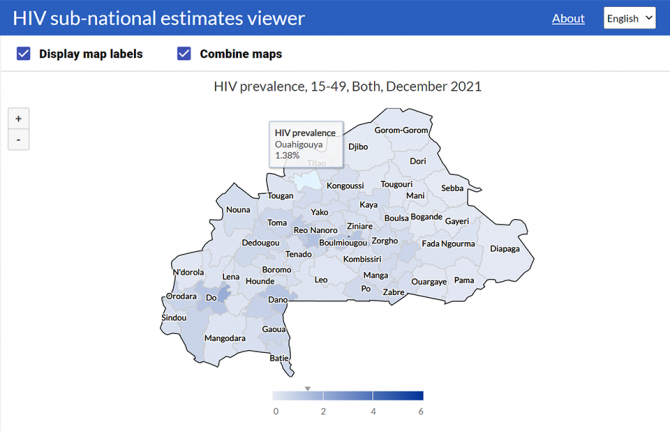
Feature Story
Improving data collection to improve national AIDS responses
29 March 2023
29 March 2023 29 March 2023During a regional UNAIDS HIV estimates workshop in Bangkok, Thailand, groups gathered around laptops to discuss national insights, including the growing HIV infections among gay men and men who have sex with men (MSM) in the Philippines, the high mother-to-child transmission rate in India, and the expansion of the epidemic among some more at-risk groups.
After months of collecting raw data in their home country throughout the year, the teams were now entering those data into specific software to analyze the results.
“Countries use the results to describe what's happening in terms of HIV incidence, prevalence, AIDS-related deaths and other indicators that are difficult, if not impossible, to directly measure,” said Mary Mahy, UNAIDS Data For Impact Director, a.i.
Since 2003, UNAIDS has supported countries to generate such uniform epidemiological measures based on data from antenatal clinics, surveys among key populations or among the entire population, antiretroviral therapy use, and more recently, HIV case reporting and vital registration systems.
At the regional workshops, country representatives, UNAIDS staff, and partners use modelling software to produce HIV estimates. “The benefit in using a model,” Dr Mahy explained, “is that it allows users to combine their best programme and surveillance data to understand what's happening with their HIV epidemic.”
Over time the HIV estimates have become increasingly granular. Since 2020, 39 countries globally can generate sub-national HIV estimates at the district level.
This year the teams put additional emphasis on developing a more complete picture of HIV among key populations (MSM, sex workers, transgender people, prisoners and people who inject drugs) to identify inequalities in the epidemiological outcomes of these different populations. That means ensuring that countries have data that looks at sex, age, whether a certain population group is more impacted than another by HIV or AIDS-related deaths for example. For UNAIDS Regional Strategic Information Officer Dr. Ye Yu Shwe this added analysis is more than just producing numbers. “It is about identifying the unequal impact of the epidemic on those who are most affected and the unequal access to services,” he explained. That is then followed by the data teams looking at what the social, and structural systems in place driving or perpetuating various results.
Charlene Tinaja from the Philippines Department of Health’s Epidemiology Bureau said that the workshop allowed her to see how the epidemic is evolving.
“Where are the new infections coming from, what are the specific age groups impacted and from what area in the country… and finally where should we strategically place interventions,” she said.
Nine separate regional workshops were held covering Eastern and southern Africa, Asia Pacific, Western and central Africa, Caribbean, Latin America Middle East and North Africa and Eastern Europe and Central Asia reaching more than 600 participants from 120 countries.
The UNAIDS estimates will be used to summarize the status of the HIV pandemic, which will be released in a July report as part of the Global AIDS update. The granularity helps to identify who is being left behind, which in turn informs efforts to adapt HIV responses to close key gaps and address persistent inequalities and more importantly advocate governments and donors.
It will also be used to measure each country’s progress in relation to their national strategic plans.
In addition, the Global Fund gauges the impact of their grants based on UNAIDS-generated HIV estimates. The estimates also enable annual reporting on progress towards the UN Sustainable Development Goal (SDG 3) of ending AIDS as a public health threat by 2030 and against time-bound targets for HIV testing, treatment and prevention services.
The UNAIDS estimates are also used to determine how the USD$ 8.7 billion dollars will be distributed among the 54 countries receiving PEPFAR support over the coming two years.
As Angeli Achrekar, UNAIDS Deputy Executive Director, said, “The HIV epidemiological estimates are the North Star for how we need to move forward.”
Our work
Related

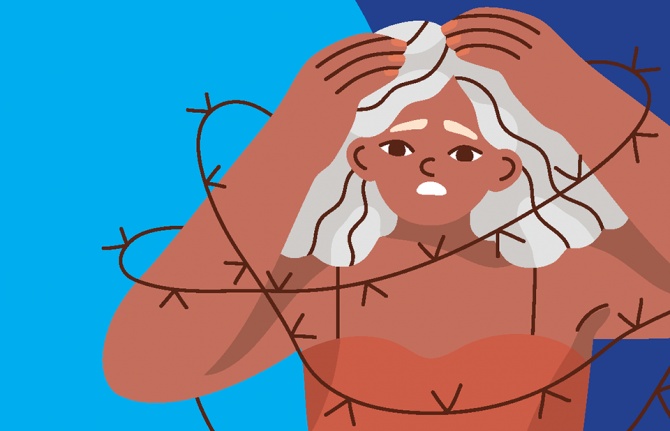
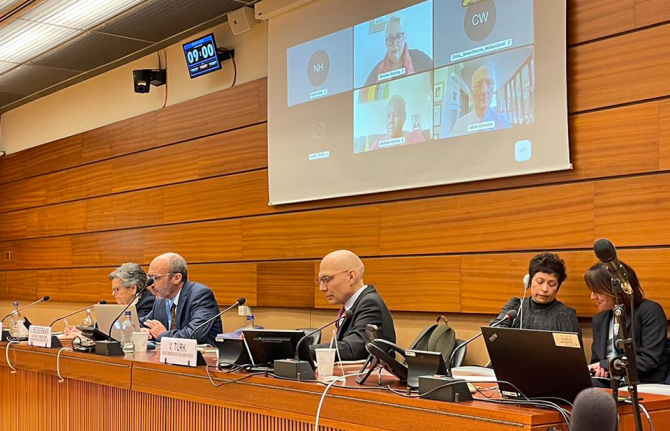

Feature Story
New legal principles launched on International Women’s Day to advance decriminalization efforts
08 March 2023
08 March 2023 08 March 2023The International Committee of Jurists (ICJ) along with UNAIDS and the Office of the High Commissioner for Human Rights (OHCHR) officially launched a new set of expert jurist legal principles to guide the application of international human rights law to criminal law.
The ‘8 March principles’ as they are called lay out a human rights-based approach to laws criminalising conduct in relation to sex, drug use, HIV, sexual and reproductive health, homelessness and poverty.
Ian Seiderman, Law and Policy Director at ICJ said, “Criminal law is among the harshest of tools at the disposal of the State to exert control over individuals...as such, it ought to be a measure of last resort however, globally, there has been a growing trend towards overcriminalization.”
“We must acknowledge that these laws not only violate human rights, but the fundamental principles of criminal law themselves,” he said.
For Edwin Cameron, former South Africa Justice of the Constitutional Court and current Inspecting Judge for the South African Correctional Services, the principles are of immediate pertinence and use for judges, legislators, policymakers, civil society and academics. “The 8 March principles provide a clear, accessible and practical legal framework based on international criminal law and international human rights law,” he said.
The principles are the outcome of a 2018 workshop organized by UNAIDS and OHCHR along with the ICJ to discuss the role of jurists in addressing the harmful human rights impact of criminal laws. The meeting resulted in a call for a set of jurists’ principles to assist the courts, legislatures, advocates and prosecutors to address the detrimental human rights impact of such laws.
The principles, developed over five years, are based on feedback and reviews from a range of experts and stakeholders. They were finalized in 2022. Initially, the principles focused on the impact of criminal laws proscribing sexual and reproductive health and rights, consensual sexual activity, gender identity, gender expression, HIV non-disclosure, exposure and transmission, drug use and the possession of drugs for personal use. Later, based on the inputs of civil society and other stakeholders, criminalization linked to homelessness and poverty were also included.
Continued overuse of criminal law by governments and in some cases arbitrary and discriminatory criminal laws have led to a number of human rights violations. They also perpetuate stigma, harmful gender stereotypes and discrimination based on such grounds as gender or sexual orientation.
In 2023, twenty countries criminalize or otherwise prosecute transgender people, 67 countries still criminalize same-sex sexual activity, 115 report criminalizing drug use, more than 130 criminalize HIV exposure, non-disclosure and transmission and over 150 countries criminalize some aspect of sex work.
In the world of HIV, the abuse and misuse of criminal laws not only affects the right to health, but a multitude of rights including: to be free from discrimination, to housing, security of the person, movement, family, privacy and bodily autonomy, and in extreme cases the very right to life. In countries where sex work is criminalized, for example, sex workers are seven times more likely to be living with HIV than where it is partially legalized. To be criminalized can also mean being deprived of the protection of the law and law enforcement. And yet, criminalized communities, particularly women, are often more likely to need the very protection they are denied.
UNAIDS Deputy Executive Director for the Policy, Advocacy and Knowledge Branch, Christine Stegling said, “I welcome the fact that these principles are being launched on International Women’s Day (IWD), in recognition of the detrimental effects criminal law can, and too often does have on women in all their diversity.”
“We will not end AIDS as a public health threat as long as these pernicious laws remain,” she added. “These principles will be of great use to us and our partners in our endeavors.”
Also remarking on the significance of IWD, Volker Türk, High Commissioner for Human Rights, said, “Today is an opportunity for all of us to think about power and male dominated systems.”
His remarks ended with, “I am glad that you have done this work, we need to use it and we need to use it also in a much more political context when it comes precisely to counter these power dynamics.”
“Frankly we need to ask these questions and make sure that they are part and parcel going forward as to what human rights means,” he said.
In conclusion, Phelister Abdalla, President of the Global Network of Sex Work Projects, based in Kenya noted: “When sex work is criminalized it sends the message that sex workers can be abused...We are human beings and sex workers are entitled to all human rights."





